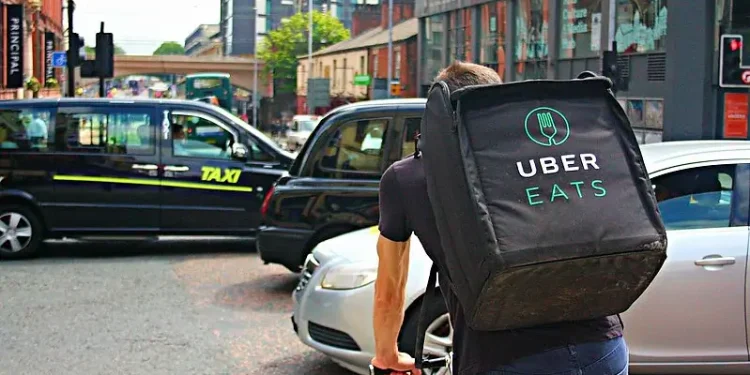The UK government has expanded its crackdown on illegal working in the gig economy through a new partnership with Deliveroo, Uber Eats, and Just Eat.
This agreement strengthens account-sharing detection, enhances facial verification checks, and shares asylum hotel locations to target illegal workers.
Details of the New Partnership Against Illegal Working
The UK government has officially partnered with major delivery companies Deliveroo, Uber Eats, and Just Eat to intensify efforts against illegal employment within the gig economy. This collaboration aims to implement advanced security measures including facial verification and fraud detection technologies.
These measures are designed to prevent the misuse of accounts and ensure that only eligible workers are engaged in delivery activities, thereby safeguarding legitimate employment practices.
How New Regulations Are Shaping Business Operations and Job Markets
With the introduction of the new Border Security Bill, all employers are now mandated to conduct thorough immigration checks. This legislation is part of a broader initiative to curb illegal working, which has seen over 10,000 enforcement visits and resulted in 7,130 arrests.
Businesses found non-compliant face severe penalties, including fines up to £60,000 per illegal worker and potential criminal charges, emphasizing the government’s commitment to enforcing these laws rigorously.
Technological Advances in Combating Illegal Work
Delivery firms are now utilizing cutting-edge technologies such as facial recognition to identify and block fraudulent accounts. This technology is crucial in verifying the identities of riders and ensuring that all participants in the gig economy are working legally.
The shared data about asylum hotel locations between the Home Office and delivery companies also plays a vital role in monitoring and preventing illegal employment practices among asylum seekers.
Statements from Government and Industry Leaders
Home Secretary Yvette Cooper stated,
“Illegal working undermines honest business, exploits vulnerable individuals and fuels organised immigration crime. By enhancing our data sharing with delivery companies, we are taking decisive action to close loopholes and increase enforcement.”
Representatives from Deliveroo, Just Eat, and Uber Eats have also expressed their commitment to this partnership, highlighting their ongoing efforts to enhance security measures and combat illegal activities within their platforms.
Eye-Opening Data and New Policies Unveiled
| Category | Detail |
|---|---|
| Enforcement Visits | Over 10,000 |
| Arrests Made | 7,130 |
| New Legislative Requirement | Immigration checks for all employers |
| Technology Used | Facial recognition and fraud detection |
Broader Implications for the Gig Economy
This strategic move by the government not only targets illegal working but also aims to stabilize the gig economy by ensuring fair competition and protecting compliant businesses. The crackdown is expected to deter illegal employment practices, thereby influencing the dynamics of labor availability in the gig economy.
Moreover, the focus on technological solutions like facial recognition could set new standards for employment verification processes across various sectors.
Navigating Upcoming Hurdles and Strategic Decisions
While the new measures are set to transform employment verification processes, they also raise questions about privacy and the balance between security and individual rights. The gig economy, with its flexible nature, faces unique challenges in implementing such stringent checks without affecting the market dynamics adversely.
Furthermore, critics argue that while these measures are necessary, they must be balanced with adequate support for workers and businesses transitioning to these new systems.
Additional Reading
Sources: UK Government Press Release, UK Government News, Workplace Journal Article, Home Office and The Rt Hon Yvette Cooper MP.
Prepared by Ivan Alexander Golden, Founder of THX News™, an independent news organization delivering timely insights from global official sources. Combines AI-analyzed research with human-edited accuracy and context.








